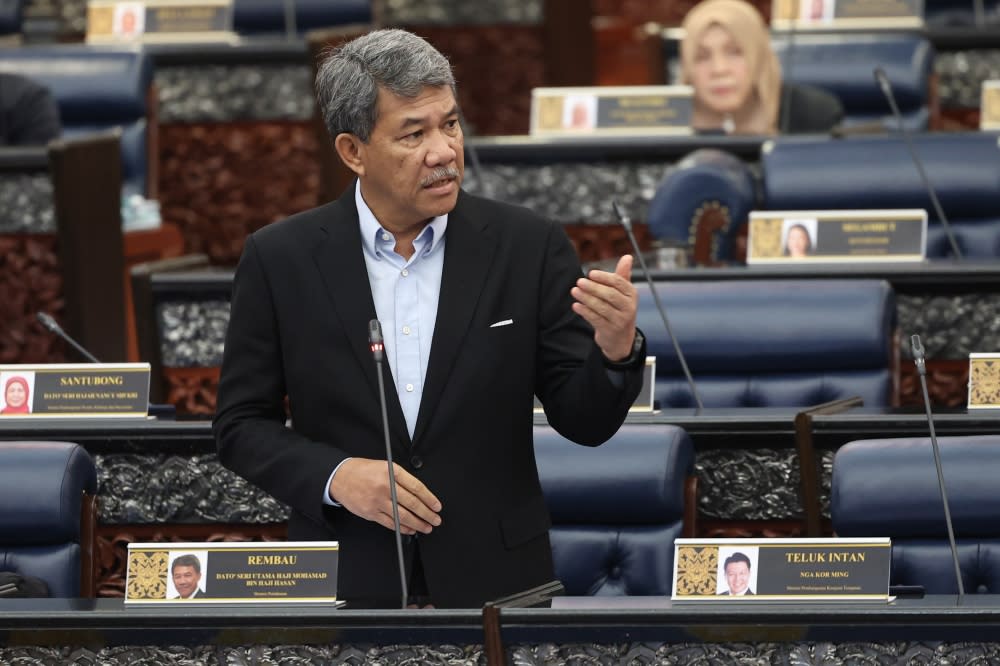No vessels equipped with nuclear warheads can pass through Malaysian waters without permission, says defence minister

KUALA LUMPUR, March 30 — Defence Minister Datuk Seri Mohamad Hasan has assured Parliament that no vessels equipped with nuclear weapons are allowed to pass through Malaysian waters without the country’s permission.
He said Malaysia abides by the principle of maintaining Asean as a Zone of Peace, Freedom and Neutrality (Zopfan), which means the region remains free of nuclear weapons and their use.
“So the issue of us disagreeing with anyone (any countries) does not arise.
“We are in a neutral zone, and we want all parties to respect this, and if anyone wants to hold any (exercise) or pass through the waters (of countries), we respect the United Nations Convention on the Law of the Sea 1982 (UNCLOS 1982).
“We have freedom of navigation and overflight but are subject to the terms under UNCLOS whereby they must seek permission from the countries whose waters they wish to pass through.
“There is no such thing as conducting an exercise without our knowledge,” Mohamad told Parliament during Minister’s Question Time today.
He also explained that the eight nuclear-powered submarines to be purchased by Australia will have nuclear-powered engines but will not be armed with nuclear warheads.
Mohamad was responding to DAP’s Bagan MP Lim Guan Eng who asked the government to state its stance following the AUKUS (Enhanced Trilateral Security Partnership between Australia, the United Kingdom and the United States) defence pact.
Under the pact, Australia will buy eight nuclear-powered submarines worth AUD368 billion, and Lim wanted to know their impact on the security of Asean countries based on Zopfan and whether the submarines will be allowed to operate in Asean waters.
The minister was also responding to a supplementary question by PAS’ Kota Baru MP Datuk Seri Takiyuddin Hassan who asked how the government would ensure the country’s safety if the vessels had nuclear missile capabilities.
Further explaining the situation, Mohamad said that based on international law UNCLOS, any ship or aircraft is given freedom of navigation or overflight in the high seas or Exclusive Economic Zone (ZEE) of any country, subject to the activity complying with the rules and laws of the coastal state (as long as not contrary to UNCLOS).
The UNCLOS also states that any submarine that through the territorial sea of another country, must always be on water surface and these rules also apply in Malaysia as well as other coastal countries in South East Asia.
“However, if there is a foreign submarine, either conventionally powered or nuclear powered, who wants to sail on below the water surface in national waters, the navy of a foreign country needs to submit an application to the Royal Malaysian Navy through a diplomatic note to obtain special approval,” he said.
This rule also applies if there is a submarine or warship that wants to enter any port in Malaysia.
“Regarding the submarine (purchased by Australia), it is a nuclear-powered but conventional weapon, meaning it is powered by nuclear power but its weaponry is still conventional, this has been explained by all three countries in detail — Australia, United Kingdom and United States.
“Australia is not allowed to take apart the nuclear box, they cannot take it apart anyway. So there is no worry of them modifying the submarine, as the standard operating procedures (SOPs) which they observe and adhere to are very tight,” Mohamad added.
He also said that matters in relation to AUKUS will be discussed during a meeting with the other ASEAN countries, with Indonesia as the host country, sometime between July to September.
“There, this will be one of the agendas that we will speak about, the setting up of AUKUS will be a priority topic when we are in Jakarta,” he said.
With regards to the setting up of AUKUS, the reason for its establishment is beyond our jurisdiction, Mohamad said.
“It is based on others' powers in this area, and that is beyond our jurisdiction.
“The reason for the establishment of AUKUS is the policy of the US and western countries regarding their presence in the Indo-Pacific, they not only observe peace in ASEAN but in the Indo-Pacific. They want to see these areas continue to be peaceful areas.
"This is capacity building as I have said earlier, and these countries are reinforcing their defence base and that is out of our jurisdiction,” Mohamad said.



